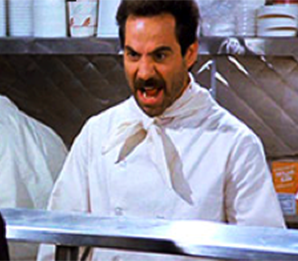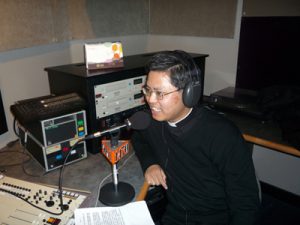Our opening exercise is to think of a time that someone hurt us. It can be recent or have happened a long time ago; it can be by our family, friend, or someone else. Next question: how did we react? Did we love them more or less? Honestly speaking, we tend to get mad at them, think negative thoughts or are cold towards them. Bottom line: our loves changes towards people who hurt us.
Jesus says today, “The Holy Spirit… will (1) teach you everything, and (2) remind you of all that I have said to you” (Jn 14:26). The Holy Spirit teaches us through the Bible, the saints, and always under the guidance of the Church; and today, we’re going to go to all three to understand God’s love for us. And the Holy Spirit will remind us of many things we already know, but perhaps in new and refreshing ways.
We’re continuing our series on why God allows suffering. Last week, we spoke about the four levels of happiness and how suffering can make sense if we live for contributive happiness and eternal happiness. Remember, we haven’t yet arrived at a complete answer, but are putting the pieces into place; once we get all four pieces, then, God willing, it’ll make sense. And even then, understanding suffering is not primarily an intellectual problem, but a problem of the heart. One time, I was with friends celebrating a birthday party, and a three year old girl wanted to have another piece of cake. When her parents wouldn’t allow it, she became very sad (it was very cute). But, of course, nothing could cheer her up, because she was fixated on the cake and didn’t understand her parents’ love for her.
In the same way, we need to understand the depths of God’s love for us. We all know God loves us, at least intellectually, but many of us don’t understand its incredible depths, or haven’t experienced it, and so we doubt it, especially when we suffer.
The first thing to remember today is: Nothing you can do can change God’s love for you. (It actually rhymes and has a meter to it (Shakespeare would be proud).) Whereas our love is conditional and changes according to how other people treat us, God’s love is unconditional. No matter how badly we treat Him or how far we move away from Him, His love for us doesn’t change. No matter how broken, wounded and sinful we are, He doesn’t love us any less. Some people have this idea that God’s a watchmaker who constructs us, winds us up and then leaves, because He’s uninterested in our lives—that is a big fat lie of the devil. While it’s true that we run away from God, He never runs from us, but stays absolutely involved in our lives.
 We mentioned Matt Fradd two weeks ago. His most important point for anyone struggling with any sin is that God is infinite, in all of his attributes, including His mercy. During his own struggle with pornography, he remembered feeling embarrassed about confessing this every week and he feared that God would be like the Soup Nazi from Seinfeld: “No mercy for you!” and send him out. While standing in the lineup for Reconciliation one day, he remembered the question St. Peter asked our Blessed Lord, “Lord, if my brother sins against me, how often must I forgive him? As many as seven times?” (Mt 18:21, NAB). Jesus, of course, says famously, “I say to you, not seven times but seventy-seven times,” which we all know means we must forgive without end, that is, perfectly and consistently. So Matt realized: if Jesus commands us to do this, then His nature must be like this, because He wouldn’t command something that He Himself wouldn’t do. Matt took great comfort in this and realized there’s no need to be afraid of God, because He forgives without end.
We mentioned Matt Fradd two weeks ago. His most important point for anyone struggling with any sin is that God is infinite, in all of his attributes, including His mercy. During his own struggle with pornography, he remembered feeling embarrassed about confessing this every week and he feared that God would be like the Soup Nazi from Seinfeld: “No mercy for you!” and send him out. While standing in the lineup for Reconciliation one day, he remembered the question St. Peter asked our Blessed Lord, “Lord, if my brother sins against me, how often must I forgive him? As many as seven times?” (Mt 18:21, NAB). Jesus, of course, says famously, “I say to you, not seven times but seventy-seven times,” which we all know means we must forgive without end, that is, perfectly and consistently. So Matt realized: if Jesus commands us to do this, then His nature must be like this, because He wouldn’t command something that He Himself wouldn’t do. Matt took great comfort in this and realized there’s no need to be afraid of God, because He forgives without end.
Whatever Jesus commands, He also does Himself—this is an amazing insight into God. Jesus also says, “Love your enemies and pray for those who persecute you… for [your heavenly Father] makes his sun rise on the evil and on the good, and sends rain on the just and on the unjust” (Mt 5:44-45). God the Father blesses those who are close to Him and those who are far away, the holy and sinners. When He pulls away what we think is a blessing, it’s for our good. Why? Because He cannot not bless us. He cannot do evil. He may allow us to suffer, but for a greater good, because He cannot ultimately hurt us—that’s not His nature. That’s the second point of today’s homily: God cannot not bless us.
The Catechism of the Catholic Church says that sin always has a punishment, but this punishment is not some “kind of vengeance inflicted by God from without, but [follows] from the very nature of sin” (1472). Sin has its own punishment because it separates us from God; it’s self-inflicted. And when He asks us to make up for our sins, it’s for our own good, to change our hearts, purify our desires, and build up virtue. Even when Jesus gets mad, corrects, or challenges in the Gospels, it’s done out of love.
Parents know that when we smack a child’s hand from touching a warm stove, we’re trying to prevent them from burning themselves. Similarly, I heard about a hard kind of punishment given by parents when children don’t listen. When a first punishment doesn’t work and a child is belligerent and questions mom or dad’s authority, a parent can institute “Blackout,” meaning that the child loses all perks (like TV, phone, games, privileges like going out, hanging out with friends, etc.) except for food, shelter, any necessities and… love. This isn’t designed to hurt the child, but to make the child realize, “You’ve crossed the line.” That’s how God disciplines us: taking away things from us to make us face reality, but it’s impossible for Him to remove love.
 St. Therese says, “I am not always faithful, but I never get discouraged. I abandon myself into the arms of Jesus, and there I find again all that I have lost and much more besides” (Fr. Jean C.J. d’Elbée, I Believe in Love, 42). When she was dying on her deathbed, and one of the sisters said, “You’re so confident in God because you’ve never committed a mortal sin in your life,” she responded, “It is not because the dear Lord… has preserved my soul from mortal sin that I am lifted up to Him by confidence and love… If I had committed all possible crimes, I would still have the same confidence; I would feel that this multitude of offenses would be like a drop of water thrown into a flaming furnace” (Ibid., 30). That’s the proportion of God’s power compared to our sins.
St. Therese says, “I am not always faithful, but I never get discouraged. I abandon myself into the arms of Jesus, and there I find again all that I have lost and much more besides” (Fr. Jean C.J. d’Elbée, I Believe in Love, 42). When she was dying on her deathbed, and one of the sisters said, “You’re so confident in God because you’ve never committed a mortal sin in your life,” she responded, “It is not because the dear Lord… has preserved my soul from mortal sin that I am lifted up to Him by confidence and love… If I had committed all possible crimes, I would still have the same confidence; I would feel that this multitude of offenses would be like a drop of water thrown into a flaming furnace” (Ibid., 30). That’s the proportion of God’s power compared to our sins.
St. Claude de la Colombiere has a prayer called “A Despair Prayer.” It says, “I will glorify You by making known how good You are to sinners… If I have grievously offended You, My Redeemer, let me not offend You even more by thinking that You are not kind enough to pardon Me.” When we doubt His goodness, it is this that hurts and offends Him most (Ibid., 41). What glorifies God more: thinking He’s limited in His love or infinite in His love? What shows His goodness more: that He only does good sometimes, or all the time, even in the worst of times? What shows His power more: that He does good when it’s easy, or when we sin, mess everything up, and in His infinite wisdom, makes something good come out of it?
Let’s realize that God deals perfectly with each person. For example, if we’re a sensitive person, God is extra sensitive with us. He knows exactly how to challenge, how to console us, when to move in and when to hold back, and He never lets us be tempted beyond our strength. He’s a God of miracles, and He works miracles all the time, when we need them, as much as we need them.
One of our parishioners once thought God was punishing her when she and her husband discovered that their child had autism and was very low functioning. Life admittedly became much harder: their daily life changed, they couldn’t go out with friends in the same way as before, it was very expensive for medication and care, and they couldn’t take him to Mass because he could attack people; instead, they had to start taking turns going to Mass while one stayed at home with the child. It took her two years to stop crying about this, because this wasn’t the motherhood she imagined.
She never stopped going to Mass, at first begging God to take the cross away, then changing her prayer: “If You are not going to take away this cross, then please help me.” The important truth to remember is that God was blessing her; it’s just that she couldn’t see it, because she was admittedly focused on worldly things.
Four years into this situation she started focusing more on her faith and started to see the blessings. For example, they met professionals who would not give up on their child; a spot opened up for him in a special school where he could learn and spend the whole day there rather than going to school for one hour and then leaving because of some problem; she saw that her family was helping as much they could; and she had the consolation of her prayer group.
 A huge breakthrough came when she went away on retreat with Fr. Anthony Ho. During one of the talks, a religious sister shared how she decided to become a sister when she saw how sisters would take care of disabled children. She also recounted how, one time, when a person came to her with a financial problem, she asked the children to pray for this person and the problem was resolved very quickly. This answered prayer was a sign of the children’s holiness. Fr. Anthony then explained that some children who are developmentally disabled may not be able to commit mortal sins, while others who lack the use of reason aren’t able to sin at all because they don’t understand what they’re doing. This means that they’re saints, not canonized saints, but they’ve never stained their baptismal garments, that is, they’ve never lost the holiness of their baptism. When they die, they’ll go straight to heaven. (It’s also important to mention that, in heaven, they’ll be in a state of perfection, meaning their disabilities will no longer impede them. Just as there’s no blindness in heaven, so there are no developmental disabilities. We’ll see our children in their perfect manhood/womanhood. This is a beautiful truth and applies to those of us who have lost children during miscarriages. If we reach heaven, we’ll have a chance to see them for the first time.)
A huge breakthrough came when she went away on retreat with Fr. Anthony Ho. During one of the talks, a religious sister shared how she decided to become a sister when she saw how sisters would take care of disabled children. She also recounted how, one time, when a person came to her with a financial problem, she asked the children to pray for this person and the problem was resolved very quickly. This answered prayer was a sign of the children’s holiness. Fr. Anthony then explained that some children who are developmentally disabled may not be able to commit mortal sins, while others who lack the use of reason aren’t able to sin at all because they don’t understand what they’re doing. This means that they’re saints, not canonized saints, but they’ve never stained their baptismal garments, that is, they’ve never lost the holiness of their baptism. When they die, they’ll go straight to heaven. (It’s also important to mention that, in heaven, they’ll be in a state of perfection, meaning their disabilities will no longer impede them. Just as there’s no blindness in heaven, so there are no developmental disabilities. We’ll see our children in their perfect manhood/womanhood. This is a beautiful truth and applies to those of us who have lost children during miscarriages. If we reach heaven, we’ll have a chance to see them for the first time.)
When this woman heard this, she realized: “It’s a gift, my son’s a gift. My child is going to heaven, he’s a saint. When I learned that through Fr. Anthony, it all came together. The elation, the release: this was no longer suffering, this was beyond suffering. That peace, happiness was indescribable. That happiness is what I hang on to. God sent my son here to help me get to heaven. If my son didn’t have autism, we would have stayed with superficial friends who spend their money on clothes, spend carelessly on shoes, watches, and cars. We would have stuck with that crowd, done fun things but meaningless things. Now we’re with people who are close to God, now I value things that really matter. God loves me enough to give me my son, to put me through this. I have a feeling that if I didn’t go through this, I wouldn’t have a good shot at heaven.”
Our prayer today is that everyone first accepts this intellectually and then that this move into our hearts. When we let this sink in we’ll never lose peace or hope. There’s no situation that God does not bless, no person that’s beyond His grasp, no evil that He does not draw good out of. Nothing you can do can change God’s love for you.